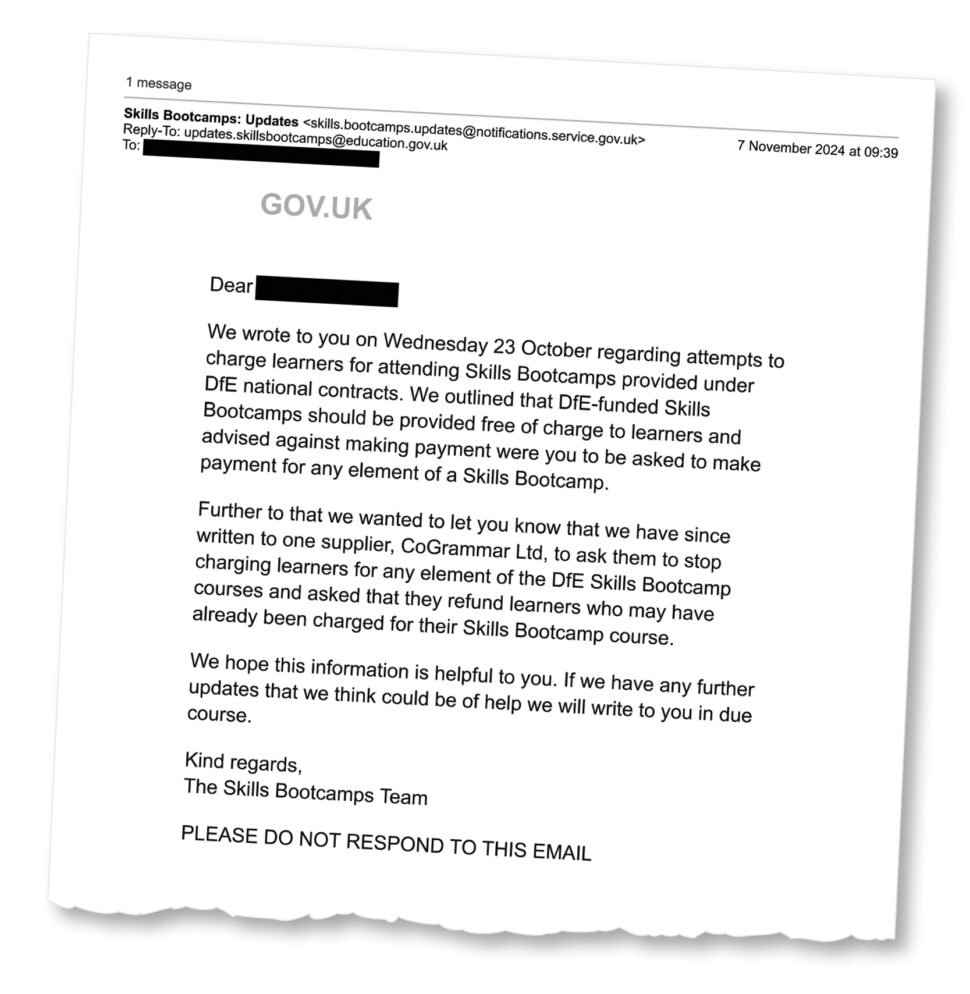An international company that raked in millions of pounds to run online coding bootcamps in England tried to charge learners for training that was supposed to be fully funded by the government.
An FE Week investigation has uncovered cases of CoGrammar Ltd demanding students pay up to £4,950 for not recording a “job offer” after the course, or face legal penalties.
Most refused to pay after a Department for Education warning about this behaviour, but at least one unemployed learner handed over cash.
Rishi Sunak’s Conservative government allocated over half a billion pounds to spend on its skills bootcamp programme between 2022-25, to train up thousands of people in up to 16 weeks for industries where there is a shortage of workers.
CoGrammar, which traded as HyperionDev and has much of its operations based in South Africa, landed contracts worth up to £22 million from the DfE to train students in England in subjects such as data science, web development and software engineering. It secured similar contracts from mayoral authorities across the country.
Funding rules state: “Individuals must not be charged for any element of the skills bootcamp.”
CoGrammar admitted to charging some students for the course when FE Week presented the company with evidence. A spokesperson claimed students had been offered an apology and promised to refund anyone affected in full, plus £25 in compensation.
Attempts to charge students were made after the Department for Education terminated the company’s contract due to performance concerns.
CoGrammar, which also paid employers to offer job interviews that are required to secure milestone payments, is currently attempting to sue multiple funding authorities including the DfE for non-payments.
‘I was so stressed out’
FE Week spoke to multiple students on tech bootcamps run by CoGrammar. The courses are supposed to be fully funded by the DfE and the company was paid in stages.
Providers can claim payments when learners start a course, complete their training, obtain a job interview and then secure employment.
CoGrammar secured partnerships with multiple Russell Group universities, which attached their names to the courses, taken by thousands of students. All training was delivered online.
The DfE suspended payments to CoGrammar last April after it “notified” the company of “concerns regarding its performance under the contracts” and began an audit, court documents state.
Contract termination followed in September, amid claims the company had committed an unspecified “prohibited act” and a “material breach” of its contract, the court documents add.
CoGrammar, which is now trying to claim almost £6 million in unpaid bootcamp payments from the DfE, tried to charge students a month later.
An email from CoGrammar, seen by FE Week and sent to multiple learners, said: “Our records show that you have failed to submit a job offer by the deadline of 30 September 2024, and due to this, you are liable for a fee payment of £4,950 for your bootcamp as stated in the student undertaking agreement you entered into.”
The company then offered a 75 per cent discount if they paid the fee upfront, or a 50 per cent discount if the student paid 12 monthly instalments via direct debit.
The last sentence of the email said: “Take action now to avoid any legal penalties.”

Laleh Haidari, 42, a senior business analyst from High Wycombe, Bucks, signed up for a DfE fully-funded data science bootcamp with CoGrammar last year. She said she trusted it was a reputable course because it was listed by the DfE as one of its providers.
After completing the course, she said she was shocked when CoGrammar sent her an email saying she must pay thousands of pounds, offering her a discount if she paid by the end of the month.
Laleh said: “I was so stressed out… I was unemployed, and it’s a big chunk of money to pay. And the reason I rushed into paying the discounted fee was that I didn’t want to pay the full fees.”
She paid CoGrammar £1,245 the same day but then received an email from the DfE, several days later, advising participants not to pay.
After Laleh complained and asked for a refund, emails seen by FE Week show that the DfE told Laleh there was “no practical advice we can give”. She had not received a refund at the time of publication.
Zainab Alam, 28, from Stockport, Greater Manchester, also received one of the emails demanding payment but didn’t pay. She started one of the bootcamps while seeking a career change from teaching.
She was terrified the bailiffs would come round as she couldn’t afford what CoGrammar was asking her to pay.
“It’s downright terrifying when you’re not able to get a job due to the job market out there and then being asked to pay back thousands of pounds that I don’t have because I have my parents to support financially as well as two younger sisters,” she said.
Pawel Werbowy, 39, from London, immediately challenged CoGrammar’s attempt to charge him for his course, telling the company “we can see in court if needed” before posting about the issue on social media.
A student experience manager for CoGrammar later “proposed” that Pawel had no payment obligation, but said in return the learner should delete his social media posts.

CoGrammar’s defence
CoGrammar told FE Week a clause was added to student enrolment agreements in 2024 which made learners liable for tuition fees, even though they signed up for a fully funded course, if there was a “lack of evidence on my residency, guided learning hours, interview, or final job outcomes” which leads to the funding authority withholding payment.
The company claimed there had been previous cases where students provided “false information” about their residency or prior training that made them ineligible for bootcamps and led to contractors stopping payments to CoGrammar after it incurred costs.
A CoGrammar spokesperson said the email demanding payment was sent with “erroneous wording to fewer than 0.5 per cent of skills bootcamp students that CoGrammar believed the DfE would not fund due to eligibility issues”.
They told FE Week: “The email did not accurately state the reason for the request, and requested payment at a 75 per cent discount of the maximum amount agreed in the student enrolment clause, which is an amount that is less than CoGrammar would receive for a funded skills bootcamp student that completes only milestone one and so would not even cover CoGrammar’s full cost of delivering a programme.”
The spokesperson claimed that “shortly after” CoGrammar sent this email, the DfE “finally confirmed the eligibility of such students and the process by which they would be evaluated for milestone payments”.
CoGrammar said that it sent affected students an email within 30 working days of the initial payment request, which “contained the corrected context of the payment request, and apology, and offered” students the choice to take a course with a partner organisation or a “full refund plus an additional £25 goodwill payment for the inconvenience”.
The spokesperson said: “CoGrammar regrets having to take the step of adding a clause to its student enrolment forms to protect against non-payments and receive confirmation of their eligibility from the DfE, and in late 2024 removed this clause from its agreements, and will not ever request payment from any student enrolled on any programme intended to be a skills bootcamp, regardless of eligibility confirmation or non-payment.”
Suspicions raised
Some bootcamp participants also raised concerns about job interviews they were offered while on courses.
One employer confirmed it had been paid “a modest reimbursement for a multi-week programme” to interview students, and did not proceed with hiring due to “our immediate project needs and workforce dynamics at the time”.
Paying employers to conduct job interviews is not against DfE rules. Securing a job interview is a key payment milestone for each bootcamp learner.
CoGrammar told FE Week it confirmed with the DfE that it could work with employers to gather feedback on curriculum and conduct interviews and that paying “market-rate rates” was “allowable”, adding that this is “common practice at other skills bootcamp providers”.
It added the company identified fewer than 0.2 per cent of the 1,803 employers it worked with on skills bootcamps were paid to offer job interviews.
FE Week found multiple cases brought by CoGrammar against public authorities over non-payment for skills bootcamps.
West Midlands Combined Authority terminated CoGrammar’s contract after the company allegedly “failed to submit individual learning records”, according to court documents.
CoGrammar said the cited reason for termination was student withdrawal rates that supposedly exceeded a 20 per cent threshold. The company believes termination was “unlawful” and is now suing for non-payment. WMCA said it could not comment as legal proceedings were live.
West Yorkshire Combined Authority (WYCA) also challenged the company’s performance and withheld payments.
CoGrammar said that WYCA later re-procured for a cloud engineering skills bootcamp it had previously been awarded, which was legally challenged by CoGrammar under the procurement act.
This matter has now been settled, the terms of which are confidential.
Ofsted’s high praise
CoGrammar’s CEO Riaz Moola, who has been dubbed the ‘Steve Jobs of South Africa’ in the country’s Sunday Times, was invited into discussions with members of the previous UK government.
In April last year he met with the then-deputy prime minister Oliver Dowden and education secretary Gillian Keegan to discuss the future of artificial intelligence in children’s education.
He set up CoGrammar in 2016 to offer commercial training for the tech industry before entering publicly funded training in 2022.
Ofsted conducted an early monitoring visit to inspect the company’s publicly funded skills bootcamps in early 2024, issuing one “significant” and two “reasonable” progress judgments, highlighting that learners develop “highly relevant skills that are in high demand”.
Freedom of Information requests showed that the DfE has received complaints regarding almost a quarter of all its bootcamp providers since August 2023. Numerous complaints involved CoGrammar.
FE Week spoke to multiple participants who said they had lost confidence in how their complaints had been handled.
The DfE declined to comment due to live legal proceedings with CoGrammar.
















Great article which exposes some truly awful practices. Having been part of an early cohort with this provider, I can vouch for how badly the course was run. I was never chased down for money fortunately but my overall experience was very poor. The support from them was non existent and it became clear they were only trying to claim the fee from the government by essentially re-defining the pass criteria in the final days of the course. The pass requirement went from something like 54 exercsies to about 18. Those 18 modules were the very basics, and in no way would anybody have been “job ready” just knowing those.